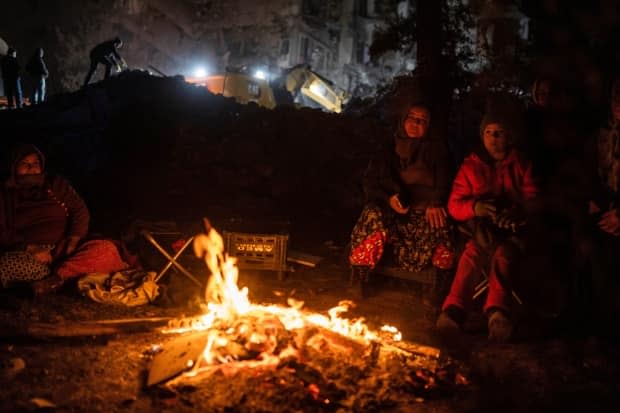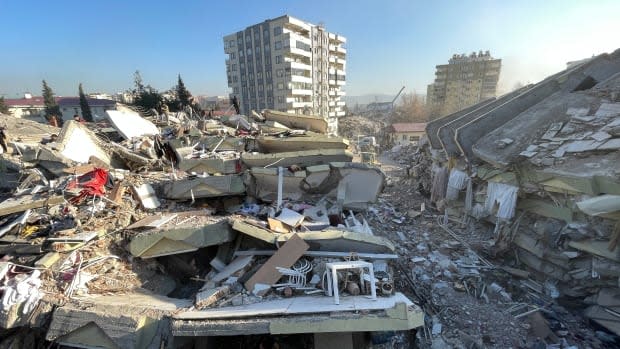She escaped war-torn Syria, then Turkey's earthquake. But she still can't come to Canada

Zahra Alshwikkh has narrowly escaped death twice — first fleeing war-torn Syria after her husband had died, then getting rescued from the rubble of a collapsed building after this month's earthquake in Turkey.
Alshwikkh, 56, has been living in the Turkish city of Urfa since 2020 after leaving Syria, waiting for her immigration papers to be processed in Canada.
Her paperwork and background checks were successfully completed nearly seven months ago in July 2022, but she's still waiting for the Canadian government to issue her travel documents.
So far, the 7.8 magnitude earthquake is estimated to have killed more than 40,000 in Turkey and Syria combined. Alshwikkh is just one of millions of people who need humanitarian aid after disaster struck in the dead of night on Feb. 6. Many are sleeping in tents, mosques, schools or in their own cars in near-freezing winter temperatures.
"We're living a life that's not even a life. We're forced to keep going," she said.
"I want to live in a safe environment," Alshwikkh said.

Her sister, Amal Alshwikkh, who will be privately sponsoring her, has been living in Canada for nearly eight years after fleeing Syria for Jordan in 2013. She first settled in Nova Scotia and now lives in Mississauga, Ont.
Alshwikkh says the earthquake only made her sister's situation worse, along with other refugees like her who are stuck in limbo.
"They are very scared, they cry … It's very cold, it's winter and they sleep outside," she told CBC Toronto.
Alshwikkh, a single mother with five daughters aged four to 11, says all she wants is to see her sister brought to safety.
The number of people killed by the earthquake has risen to 36,187, according to authorities. In Syria, where the earthquake has compounded a humanitarian crisis caused by 12 years of war, the reported death is toll 5,800.
"This is just one of those millions of cases that remind us that Syrian refugees are among the most traumatized people on the planet," said Matthew Behrens, coordinator with the Rural Refugee Rights Network, an organization that works with refugees who are trying to enter Canada, and people who are being deported back to their home countries.

Behrens, who has been working with the sisters to help fast-track Alshwikkh's arrival in Canada, is calling on the federal government to act with urgency.
"There's over three-and-a-half million of them living in Turkey and Amal's sister Zahra is one of them."
"The question is how many times does she have to face death before the Canadian government's going to treat the risk to her seriously?"
IRCC says due to privacy legislation, it cannot comment on any specific case.
"The Government of Canada is deeply concerned for the safety and well-being of those impacted by the earthquakes. We are watching the situation very closely and determining the best path forward," said IRCC spokesperson Stuart Isherwood in a statement Friday.
"When responding to international crises, Canada tailors each response to meet the unique needs of those who require our support. We coordinate with our international partners and consider what they are doing to support."
Isherwood said the federal government generally can issue single journey travel documents, which are one-time travel documents issued to foreign nationals.
The documents are commonly used for resettled refugee clients who are unable to obtain travel documents from their country of nationality.
He said processing times can vary based on the type of application submitted, if it is complete, how long it takes an applicant to respond to requests raised, among other factors.
Behrens said his group is aware of many other Syrian refugees who are waiting in limbo for their final paperwork.
"We're greatly concerned that Zahra not wind up in those horrid statistics of folks who almost made it here, except for a refusal of Ottawa to actually expedite their case," Behrens said.
"We're not asking Canada to do anything unique. We're not asking for her to be put in front of a line. She is now by the basis of her approval entitled to come to Canada," he said.
"All we're asking the Canadian embassy is to immediately issue her the travel documents and as a matter of policy, IRCC should also be fast tracking all of the other Syrian refugee applications for those who are in this earthquake zone."

Alshwikkh travelled to Turkey in December and saw her sister for the first time in 10 years. Her family in the Syrian province of Aleppo was also affected by the earthquake. Her mother and three brothers, who are all married and have children, lost their homes which collapsed, leaving them with no shelter.
"I can eat, I can drink, I have everything in my house. It's safe, it's warm," she said.
"But other people like my sister, they have nothing."
Behrens said his group is prepared to take care of travel arrangements if that could bring Alshwikkh to Canada sooner.
"The embassy could call her up at any moment and say, 'We've got them, come to Ankara and pick them up,' and we'll make the arrangements to get her there," he said.
"Zara should not spend one more night freezing in the cold because it's too dangerous to be anywhere else."


